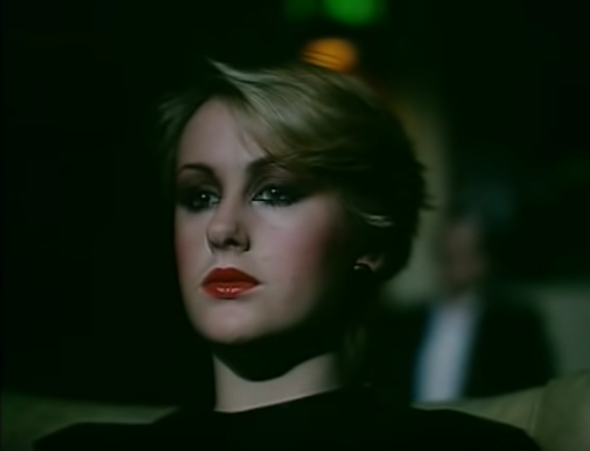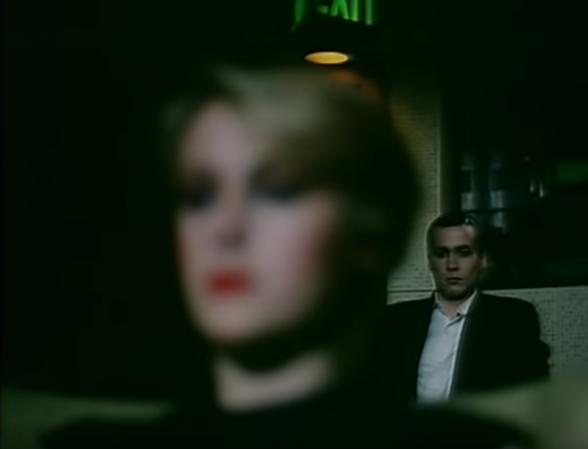It’s my contention, for the purposes of this essay, that all artistically successful groups have a project. To pick a few at random: the Ramones’ project was to sandblast 20 years of barnacles off the hull of rock and roll. Pavement’s project was to map the disconnect between education and vocation in the post-Reagan era. In 1981, the Human League’s project was to sell out, and they did it with gusto.
It wasn’t always thus. Early on, they were saddled with the “band of the future” tag that rarely does a young group any favors. (They may have invited it by originally calling themselves…”The Future.”) Their first two albums are sparse, chilly synthpop with one-word titles that critics loved and not many people bought. (An unlikely cover of “You’ve Lost That Loving Feeling” on Reproduction is an early highlight.) Their third album is sparse, chilly synthpop with a one-word title that went multi-platinum and had 4 hit singles. What changed?

Phil Oakey had been invited to join the fledgling Human League as a singer by Martyn Ware & Ian Craig Marsh, two electronics boffins who knew they needed someone with charisma to front the group. Oakey had never sung in public but he looked the part. After their first two albums, the band was treading water commercially, and Oakey was ready to cash in. A power struggle ensued that resulted in Ware & Marsh walking away from the band and forming Heaven 17, inviting Glenn Gregory to be the singer in a hilariously petty move (Gregory was supposedly their original pick for the Human League as well).
Faced with a legal responsibility to mount a Human League tour and fulfill the group’s recording contract, Oakey brought in some studio ringers and two teenage scenesters he’d come across in a club, Susan Ann Sulley and Joanne Catherall. Martin Rushent, an engineer and producer who’d made a name for himself working with pop-leaning punk acts like Buzzcocks and The Stranglers, whipped the thrown-together new lineup’s material into shape, and the result was Dare.
The always-vicious UK music press expected the new-look Human League to fail spectacularly – it was widely agreed that Ware & Marsh were the talented members of the group, and adding two young female singers was seen as an act of desperation. Instead, the first three singles peaked at #12, 3, and 6, respectively. When Virgin decided to squeeze one more single out at the end of November 1981, Oakey resisted, not liking the song choice or the timing. He lost the battle, and “Don’t You Want Me” was that year’s Christmas #1. It remains their signature song to this day. Oakey had wrested control of a band he had not founded, pointed it squarely at the charts, and he succeeded beyond all expectations.

There’s something endlessly replayable about good synth-pop – the clear tones and bright melodies never seem to tire the ear. Unlike some of his contemporaries in the genre, Oakey is not a particularly expressive or accomplished singer, but his voice has an interesting grain that plays well against the synthesizers. (According to Rushent, the vocal for this track and some others on Dare was recorded in the studio bathroom.) The addition of Sulley on the answer verse helps break up the monotony of his limited range, although it has to be said she’s no virtuoso either. The lyric’s Pygmalion overtones may have seemed like a meta-commentary on the new lineup’s formation, with the two new female singers seemingly plucked from obscurity, but was pure fiction. (Actually, the reference to the male and female singer’s five-year relationship reads a little creepy, since Sulley was only 18 at the time.)
Ultimately, “Don’t You Want Me” plays like the logical endpoint of the original Human League project – the infiltration of post-punk’s moodiness and blank affect into the pop mainstream. (This approach would be taken to the logical extreme a few years later with the “New Pop” of ZTT Records.) Oakey’s original demo sounds like early Cabaret Voltaire without the menace, all synth squiggles and no chorus. He supposedly thought the final version, completed by Rushent and Jo Callis, was a disaster, and tried to bury it at the end of the 2nd side of Dare. But by both accident and design, it was the production that made it a classic. Rushent says a computer glitch set one of the synth lines a half-beat back, giving the song its unusual driving rhythm, and the melodic flip of the original pre-chorus, which originally descended on the words “both be sorry,” lets the song rise to its cathartic chorus, destined to be shouted over jukeboxes and karaoke singers until the end of time.
The Human League never matched the success of Dare, though they’ve managed a consistent career, still tour, and have never officially gone on hiatus. Oakey’s erstwhile bandmates in Heaven 17 had their own big synth-pop hit less than 2 years later with “Temptation,” which never really crossed over in the US but went to #2 in the UK. Both groups tread the same nostalgia circuit to this day.
I know most of what I know about The Human League from reading “Rip it Up and Start Again,” Simon Reynolds’ excellent survey of post-punk. (The rest came from this great interview with Rushent.) I devoured the book shortly after its US publication in 2006, and was particularly taken by the chapter about the Human League schism, of which I was previously unaware. One day not long after, I was walking around at work absently humming “Don’t You Want Me,” when a co-worker commented on my song selection. I proceeded to enthusiastically recount the history of the band, doing that aggravating thing men sometimes do when they’re in possession of new information and feel the need to regurgitate it to the first person who shows the tiniest bit of interest. I cringe now to think what I must have sounded like, but it can’t have been too bad – that conversation led to others with the same co-worker, and we’re celebrating our 10th wedding anniversary next year. Music can be a strange and powerful connector; that much is true.